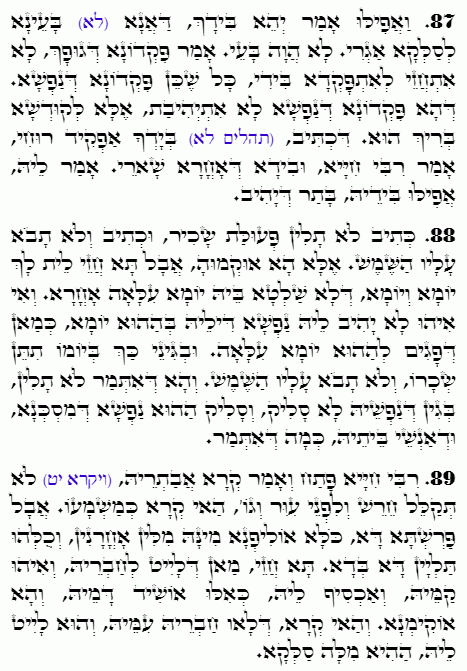Daily Zohar # 4550 – Kedoshim – Let not the sun go down on it
Daily Zohar 4550

Hebrew translation:
88. כָּתוּב לֹא תָלִין פְּעֻלַּת שָׂכִיר, וְכָתוּב וְלֹא תָבוֹא עָלָיו הַשֶּׁמֶשׁ. אֶלָּא הֲרֵי פֵּרְשׁוּהָ, אֲבָל בֹּא רְאֵה, אֵין לְךָ יוֹם וָיוֹם שֶׁלֹּא שׁוֹלֵט בּוֹ יוֹם אַחֵר עֶלְיוֹן. וְאִם הוּא אֵינוֹ נוֹתֵן לוֹ אֶת נַפְשׁוֹ בְּאוֹתוֹ יוֹם, כְּמִי שֶׁפּוֹגֵם אֶת אוֹתוֹ יוֹם עֶלְיוֹן. וּמִשּׁוּם כָּךְ בְּיוֹמוֹ תִּתֵּן שְׂכָרוֹ וְלֹא תָבוֹא עָלָיו הַשֶּׁמֶשׁ. וְזֶה שֶׁנֶּאֱמַר לֹא תָלִין, מִשּׁוּם שֶׁנַּפְשׁוֹ לֹא עוֹלָה, וְעוֹלָה אוֹתָהּ נֶפֶשׁ הֶעָנִי וְשֶׁל אַנְשֵׁי בֵיתוֹ, כְּמוֹ שֶׁנִּתְבָּאֵר.
89. רַבִּי חִיָּיא פָּתַח וְאָמַר פָּסוּק אַחֲרָיו, לֹא תְקַלֵּל חֵרֵשׁ וְלִפְנֵי עִוֵּר וְגוֹ’. פָּסוּק זֶה כְּמַשְׁמָעוֹ, אֲבָל מִפָּרָשָׁה זוֹ כֻּלָּהּ לָמַדְנוּ מִמֶּנָּה דְּבָרִים אֲחֵרִים, וְכֻלָּם תְּלוּיִים זֶה בָּזֶה. בֹּא רְאֵה, מִי שֶׁמְּקַלֵּל אֶת חֲבֵרוֹ, וְהוּא לְפָנָיו, וּמְבַיֵּשׁ אוֹתוֹ, כְּאִלּוּ שָׁפַךְ אֶת דָּמוֹ, וַהֲרֵי בֵּאַרְנוּ. וּפָסוּק זֶה כְּשֶׁאֵין חֲבֵרוֹ עִמּוֹ, וְהוּא קִלֵּל אוֹתוֹ, אוֹתוֹ הַדִּבּוּר עוֹלֶה.
.
Zohar Kedoshim
Continued from previous DZ
#87
And even if the worker says, “Keep my wages with you. I do not wish to receive my wages,” he would disagree, saying, “The deposit of your body is not suitable to be kept with me, let alone the deposit of the soul. For the deposit of the soul is given only to the Holy One, Blessed be He, as it is written,
Psalm 31:6
“בְּיָדְךָ אַפְקִיד רוּחִי פָּדִיתָה אוֹתִי יְהוָה אֵל אֱמֶת”
“Into Your hand I commit my spirit; You have redeemed me, O YHVH God of truth.”
Rabbi Chiya asked, “And in the hand of another, who is not its owner, is it permissible to deposit his wages?” He replied, “Even in the hand of its owner, it is permissible to deposit, even after he has already given him his wages into his hand.”
#88
Asking it is written, “Do not withhold the wages of a hired worker.” It is written, “Let not the sun go down on it.” (Deuteronomy 24:15). This implies that he must give him his wages before the sun sets. Previously, it was said that only overnight delay was forbidden. He answers, but indeed, they have established this understanding. However, there is not a day that is not governed by another supreme day, that is, one sefira, which is one day from the seven supreme days known as Chessed, Gevurah, Tiferet, Netzach, Hod, Yessod, Malchut. And if he did not give him his soul, that is, his wages, on that day, it is as if he blemishes that supreme day, and for this reason, “On his day you shall give him his wages and let not the sun go down on it.” And this which is said, “Do not withhold,” pertains to the punishment because at night, his soul does not ascend, and the soul of the poor and his household ascend then, as explained. (In #85 above).
#89
Rabbi Chiya opened and said, regarding the verse,
Leviticus 19:14
“לֹא תְקַלֵּל חֵרֵשׁ וְלִפְנֵי עִוֵּר לֹא תִתֵּן מִכְשֹׁל וְיָרֵאתָ מֵּאֱלֹהֶיךָ אֲנִי יְהוָה”
“You shall not curse the deaf, nor put a stumbling block before the blind, but shall fear your God: I am the YHVH.”
This verse’s meaning is as it appears. However, from this parashah, we have learned other, higher things that are all interconnected. For every branch below, it points to its root above. Come and see one who curses his fellow man in his presence and disgraces him; it is as if he has spilled his blood. And we have explained. This verse speaks of when his fellow man is not present, and he curses him, that speech ascends above, and turn testifies him.
{||}

 Previous: Kedoshim
Previous: Kedoshim
